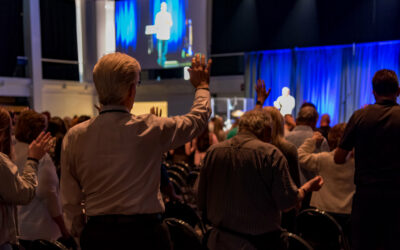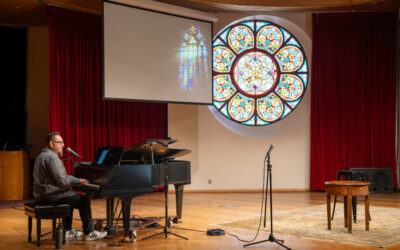We’ve seen this story before. State sanctioned brutality against people of color in the United States has been going on for as long as white people have been in America. Again and again, Black men and women have been killed with no due process and for no reason other than the color of their skin. People have protested in the streets. The voiceless have voiced their fury through violence. But it feels like there’s something different now.
Maybe it’s because we’re in the middle of a pandemic of global proportions that has put in stark relief the real nature of our sickness?
Racism is a Virus
The leadership of the Free Methodist Church in Southern California (FMCSC) have been passing around a link to a podcast from Larry Wilmore, known for hosting The Nightly Show with Larry Wilmore and being the Senior Black Correspondent on the Daily Show for years. In the episode “Thoughts on George Floyd and the Virus of Racism in America” (note: explicit language) Larry suggests that maybe we need to start thinking about racism differently…
Look, it’s easy to think of racism as just hate. But I think in order to understand it fully […] I just think we need to talk about it differently. Like, it’s like if we view racism as more of a disease: if it was more of a novel coronavirus. COVID 1619, if you will.
Then I just think we can relate to it a little better, especially what we’ve been through the last few months. America has dealt with the disease of racism since before its founding, but unfortunately has not achieved herd immunity.
And like a viral outbreak, many of the carriers of the racism virus can be asymptomatic. You could be standing right next to them and have no idea that they’re carrying racism. I mean, they’re not coughing, don’t have a fever, not calling you [N—-]. There appears to be no reason for you to be alarmed.
And they may not even know they’ve got the virus. I mean, maybe a parent or grandparent had it, but at the most they might have the antibodies. They certainly don’t have the live racism virus. Because if they had COVID 1619, their lungs would be filled with hate. And that hate would come spewing out of their mouths. See?
But that’s not how the racism virus works. If all it did was appear as hatred, it has no chance to survive, and viruses must survive. The racism virus is sneaky, because here’s what it did: It found a host and that host has allowed it to survive centuries without fear of being eliminated. And I’m speaking, of course, of white supremacy.
If racism is a virus, it seems like eliminating it should be something we know how to do, but it requires hard work that we’ve been unwilling to do.
A Lack of Responsibility
America’s response to COVID-19 has been eerily similar to its response to racism. There is an unwillingness to take responsibility to do what it takes to stop the virus in its tracks. People seem willing to live with a little of the virus if it allows them to hold on to what feels safe. Sadly, even the church is suffering from this contagious passivity that endangers lives, while declaring persecution when directed to act responsibly.
We’ve abdicated responsibility in the name of “Christian Unity” but the truth is: we aren’t unified with Christ, just unified as an organization in our willingness to stay silent to not offend.
We cannot continue to simply live with the virus and be OK with it. Even if we’re asymptomatic, you and I are passing that virus along without even thinking about it. We never needed to think about it. But that’s the absolute antithesis of what Christ called us to be to the world, and our neighbors are dying. If we’re honest with ourselves, our lack of willingness to take responsibility and stamp out the virus completely is killing them.
Bring the Light – Love the Stranger
While some people may think pouring bleach on the virus of racism is the answer, the only real solution is hard, bright light applied thoroughly and consistently. But here’s the thing: it only works if we leave the virus in the light for long enough and we don’t attempt to hide any part of the virus from the light.
The Parable of the Good Samaritan (Luke 10:25-37) was all about shining light on the reality of racism in a culture and time that feels weirdly familiar. One thing we don’t often remember when preaching this parable is that the question Jesus was answering wasn’t, “What must I do to be a good person?” but rather, “What must I do to inherit eternal life?” The answer: “‘Love the Lord your God with all your heart and with all your soul and with all your strength and with all your mind’; and, ‘Love your neighbor as yourself.’”
In other words: to be in unity with Jesus – to be his follower and inherit eternal life – take responsibility for your neighbor and their suffering… even if you didn’t cause it.
Bring the light.
Each year the FMCSC holds an event called the Free Methodist Experience (FMx). We invite speakers from both inside and outside our tradition to challenge our understanding of what church is while offering our leaders the opportunity to engage in discussion about what the church could be. A few years ago we were fortunate to have Dr. Rukshan Fernando – now Interim Provost at Azusa Pacific University and an FMCUSA Board of Administration member – speak to us about what it takes to bring concrete change to a church that must “love the stranger” and begin to eradicate the virus of racism that fills our churches.
To really love our neighbors, we need to first recognize that those of us who live at the center of culture are especially blessed with relatively easy access to power and resources and the benefit of a common language that allows us to ignore our real differences. Then, we must decenter ourselves from our needs, our importance, our traditions and even our shared stories. We have to go where Christ is – in the margins, learning to speak the language of the oppressed, opening space for new leaders, and being explicit about who we mentor.
It’s Time to Shine Some Light
Before you do anything else today, watch the video. Listen. Shine light on your own heart. Shine light on your congregation. Shine light on your community and on this conference. Then, begin to be strategic about making changes that will eliminate – not just hide – the virus that we’ve allowed to live too long in our communities, in our congregations, and in ourselves.
Your Superintendent Team


